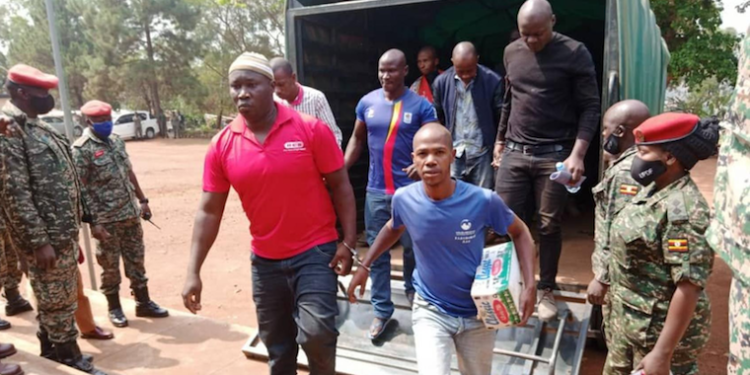Uganda is again engulfed in a crisis of its government’s own making. The youth, tired of the deeply entrenched corruption that has crippled public service delivery and stunted progress, are rising to demand justice. However, instead of listening to their rightful cries, President Museveni and his corrupt regime have responded with their usual cowardly and oppressive tactics, deploying military force to intimidate and silence dissent.
On the eve of the planned anti-corruption protests on July 23, the government disgracefully deployed dozens of UPDF soldiers to besiege the National Unity Platform (NUP) headquarters in Kavule, Kampala. This act of brazen intimidation came just before a scheduled press conference by NUP leader Robert Kyagulanyi, also known as Bobi Wine. “The cowardly regime is so afraid of the people because they know how much they have wronged them!” Kyagulanyi rightly pointed out, underscoring the regime’s terror of accountability.
Despite the police declaring the demonstration illegal and threatening participants with severe legal repercussions, legal experts maintain that Ugandans have a constitutional right to peacefully protest. The youth, driven by a profound frustration with rampant corruption, are resolute in their stand. Their message is unequivocal: the corruption undermining public service delivery must end.
President Museveni’s response has been nothing short of paranoid and autocratic. In a pathetic attempt to discredit the genuine grievances of Ugandans, he accused “certain elements, including some opposition figures,” of collaborating with foreigners to incite chaos through riots and illegal demonstrations. This tired rhetoric is a transparent and desperate attempt to divert attention from his regime’s colossal failures and scapegoat the opposition.
“If these actions continue, further measures may be taken,” Museveni ominously warned, clearly indicating his willingness to escalate the crackdown. His patronizing advice for protesters to contact Col. Edith Nakalema, who organized an Anti-Corruption Walk in 2019, is laughable. It is a feeble attempt to placate the public with hollow gestures while real corruption thrives, protected by the very regime that claims to combat it.
Museveni’s disdain for peaceful protest is evident in his derisive comments about demonstrations in Kampala, suggesting that protesters would disrupt commerce by trampling on vendors’ goods. “You are playing. Do not have such ideas in your head,” he sneered, dismissing the legitimate demands of citizens as trivial. This is the language of a dictator who has long lost touch with the realities and struggles of his people.
The military’s occupation of NUP offices and the regime’s threats are not signs of strength; they are stark admissions of weakness. As Bobi Wine aptly put it, “Blockades like these are never a sign that they are so strong—they’re a sign that they are so weak.” The government’s actions reveal a deep-seated fear of losing control, facing the consequences of its corruption, and being held accountable by the very citizens it pretends to serve.
This scenario is not unique to Uganda. In neighboring Kenya, mass protests have forced President William Ruto to take drastic actions, including firing his cabinet and implementing measures to combat corruption and prevent wastage of public funds. The Ugandan government’s refusal to heed the lessons from across the border is a testament to its arrogance and contempt for its people.
The youth of Uganda are standing up not just against corruption, but against a regime that has repeatedly shown it will go to any lengths to maintain its iron grip on power. The deployment of military forces to suppress peaceful protest is a blatant violation of human rights and a clear indication of the government’s priorities. Instead of addressing the root causes of corruption and improving public service delivery, Museveni and his cronies prefer to silence dissent with brute force.
As the world watches, it is imperative that the international community holds the Ugandan government accountable for its actions. The use of military force to intimidate and suppress peaceful protests is unacceptable and must be condemned in the strongest terms. The youth of Uganda are fighting for a better future, one free from the shackles of corruption and oppression. It is a fight that deserves the support and solidarity of all who value justice and democracy.
Uganda’s corrupt regime can no longer hide behind its military might. The voices of the youth, demanding accountability and transparency, will not be silenced. The time for change is now, and it is up to the people of Uganda to rise and reclaim their country from the clutches of a corrupt and tyrannical government.







Discussion about this post